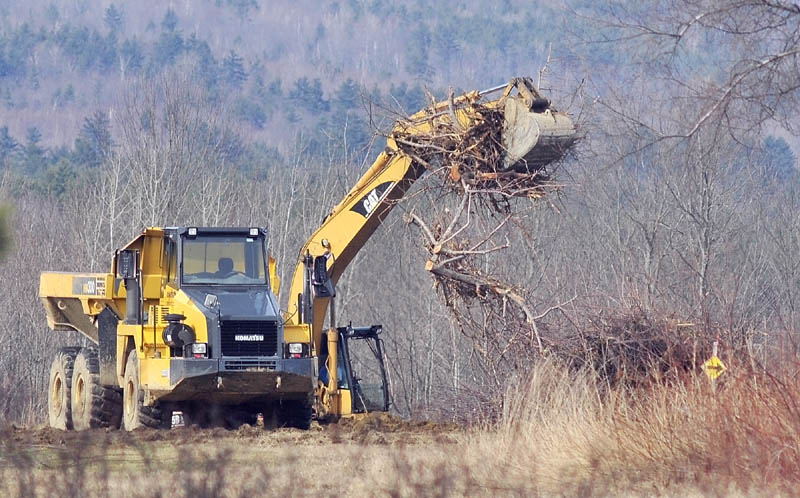KENTS HILL — It takes a community to save a farm.
Case in point: Kents Hill Orchard.
Purchased in 2009 by the Maine Farmland Trust, the 84-acre orchard is being sold to Belle Vue Farm LLC owners Brian and Lee Ann Baggott, of Manchester, the Trust announced Tuesday.
Brian Baggott said the orchard will become a vegetable farm where he will grow zucchini, squash and cucumbers.
“We are excited to produce nutritious, excellent quality, locally-grown produce, and we share Maine Farmland Trust’s vision of preserving active and productive farmland,” Baggott said Tuesday.
Darcy Whittemore, one of the volunteers with the project, said she was thrilled to hear the Trust had a buyer for the land.
“The community effort to keep the land in agriculture succeeded,” Whittemore said. “Now the community will have another farm from which to buy locally grown produce, and the character and view from the top of Kents Hill will be conserved.”
A purchase price was not disclosed, but the transaction was an unusual one, outside the conventional real estate market. The orchard owners offered the land to Maine Farmland Trust at a below-market price. Trust officials were bound to reselling the land to a farmer at an even-lower price after reducing its $356,000 assessed value through a conservation easement.
Belfast-based Maine Farmland Trust works to protect farmland through a variety of methods.
In the Kents Hill case, it used a preservation model it calls “Buy/Protect/Sell,” in which the Trust acts as a kind of holding company: It purchases the land, keeps it out of development, then solicits bids from those in the agricultural community who would be required to keep the property as working farmland.
In Kents Hill, observers of the deal said, it couldn’t have been done without the help of the community.
More than 160 people contributed time and money. The total raised in the community and through grants, including $10,000 from the Kennebec Land Trust, was $112,000.
The owners of three local summer camps teamed up to raise $30,000 in a challenge that was matched this year with a community fundraiser.
Andy Lilienthal, owner of Camp Winnebego, in Fayette, said he’s thankful for the work done to keep the area “productive, beautiful and intact.”
He was joined by Keith Kline of Camp Laurel in Mount Vernon and Linda Courtiss and Turner Ragsdale of Camp Vega, in Fayette, in the challenge.
Maine Farmland Trust Executive Director John Piotti said he’s thankful for the support of the community, the town of Readfield and the Kennebec Land Trust.
He said a unique aspect of the farm is that the public can enjoy access trails along the perimeter that connect with existing trails on abutting land.
“This is a very special property, and we are delighted to have had community help to keep it productive,” Piotti said.
Stacy Gambrel, lands projects coordinator for the Trust, said apples have been grown on the Kents Hill property for more than 50 years.
She said the Drake family purchased the farm in the mid-1970s and originally ran the orchard primarily as a wholesale operation with hired seasonal pickers.
For the last few years, she said it was a pick-your-own operation.
“I’m not sure who owned the property before the Drakes,” Gambrel said. “I understand the former owners grew vegetables on the property as well as apples. The Drakes referred to them as truck farmers — they would sell their vegetables by truck along the roadside and at farmers markets. In the more distant past, the orchard property was owned by the founder of Kents Hill School, Luther Sampson.”
She said the Baggotts will raze the orchard so the land can be converted to vegetable production.
Eventually, about 60 acres of the property will be planted with crops, she said.
“Many of the apple trees were past their prime and would’ve needed to be removed and new trees would’ve need to be planted for it to be a viable, profitable orchard ground again,” Gambrel said. “Some of the trees, about 200 or so, have been saved and will be transplanted to the Drake Family’s abutting land that they retained.”
One-third of Maine’s best farmland will be in transition within the next 15 years, said Piotti.
“Much of that farmland is likely to be lost to development unless active steps are taken to preserve it,” said Piotti. “That’s why we’ve set a goal to protect 100,000 acres of farmland within the next five years. That’s the scale necessary if we are to make meaningful impact.”
Mechele Cooper — 623-3811, ext. 408
mcooper@centralmaine.com
Send questions/comments to the editors.



Success. Please wait for the page to reload. If the page does not reload within 5 seconds, please refresh the page.
Enter your email and password to access comments.
Hi, to comment on stories you must . This profile is in addition to your subscription and website login.
Already have a commenting profile? .
Invalid username/password.
Please check your email to confirm and complete your registration.
Only subscribers are eligible to post comments. Please subscribe or login first for digital access. Here’s why.
Use the form below to reset your password. When you've submitted your account email, we will send an email with a reset code.